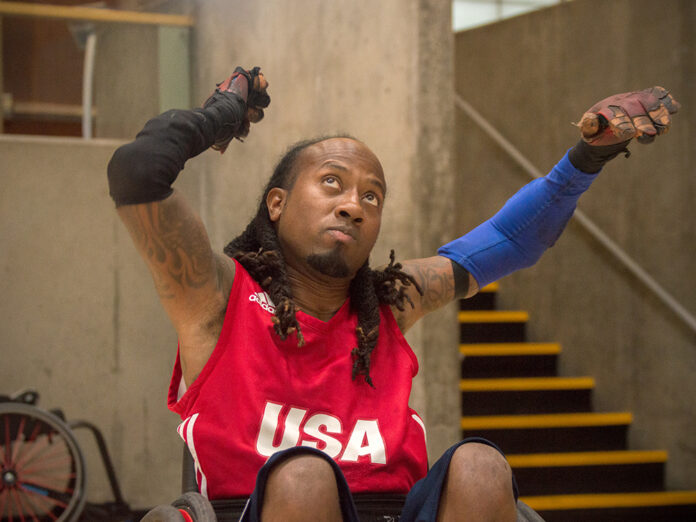
When the 2020 Paralympic Games kick off Aug. 24 in Tokyo, a Maricopa athlete will be going for the gold.
Joseph Jackson, who lives in Acacia Crossings, qualified for the Paralympic team in May. A member of the U.S. Wheelchair Rugby team since 2017, he is one of 16 players on the training squad. He was among the 12 selected to go to Japan, which is holding the 2020 Games a year later due to the pandemic. Jackson has been an athlete since he was young.
During a Hamilton High School football scrimmage for a state playoff game in
November 2005, he ran over to help on a gang tackle. He did not get up. He broke his C6 vertebrae on the play and became an incomplete quadriplegic, meaning his injury caused partial damage to the spinal cord and left connections between the brain and areas below the level of injury.
Jackson started playing quad rugby in 2007 and four years later joined the team at Ability360 Sports & Fitness Center in Phoenix, which provides adaptive sports and fitness programs for people.
His wife Sarah said he made the Team USA training squad for the first time shortly after they started dating.
“Joe has dedicated a huge portion of his life to Team USA and the chance to win a gold medal. It’s the ultimate dream, right?” she said. “Over the last five-and-a-half years, he’s continued to amp up his game, his training and his dedication to this dream and to his team. He’s really come into his own in his position.
“It’s amazing to see him getting recognized for all his hard work. I know he will be a pivotal part in fighting for that gold medal!”
Jackson, who runs a foundation to help children with spinal cord injuries, answered a few questions during a break in training.
InMaricopa: How long have you lived in Maricopa, and what brought you here?
Joe Jackson: I’ve lived in Maricopa for two-and-a-half years. We bought a house out here to start our family. It reminded me of Chandler in the late
‘90s. It’s a growing, family-oriented city.
IM: You were a teenager when you suffered your spinal cord injury. What were your emotions at the time as far its impact on your future?
JJ: I was honestly worried about how I was going to complete my junior English paper. I had just finished my rough draft. I wasn’t too worried about what was ahead. I was really upbeat and positive about the whole experience. I believe that was because I had an athlete’s mentality. I looked at everything I needed to do to be successful as a workout and challenge. I really enjoyed physical and occupational therapy sessions. My favorite part of the day when I was in the hospital was when I had outpatient rehab.
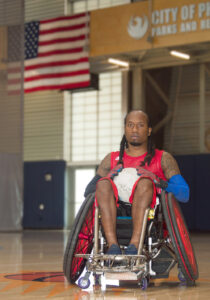
IM: What does your training regimen look like and how did you have to adapt with COVID-19?
JJ: When I’m home, I train 5-6 times a week for two hours. When I’m at training camps with my teammates, we stay in Birmingham, Alabama, training at Lakeshore Foundation Olympic & Paralympic Training Site. These camps can last anywhere from 6 to 14 days. We train for three hours, twice a day, anywhere from 4 to 9 days depending on the camp.
When COVID-19 hit, it wasn’t too hot outside, so I’d train 5 to 6 days a week at the basketball court in my neighborhood in my rugby chair. I lifted weights in my backyard. Summer hit and Ability360 was closed until June (because of pandemic restrictions). Luckily, a former teammate from football at Hamilton High School, Dontay Moch, invited me to his outdoor gym, where he’d be my personal trainer. I’d wake up at 4 a.m., leave my house at 5 a.m., get to his gym by 6 a.m., work out for an hour and head home at 7 a.m. I got up early to beat the heat. I worked out with Dontay from August to October and got back to working out at Ability360 in November.
IM: Rugby is a tough sport no matter how you play it. What is it like to play wheelchair rugby, which was originally known as murderball?
JJ: Man, it’s exciting! Being able to compete and be an athlete again is beautiful, especially when you’re unsure if it’s possible. Chair-to-chair contact is encouraged. Big hits, people falling, people getting juked, making impressive passes and spectacular catches. It’s a rush and extremely strategic at a fast pace. There’s no other Paralympic sport like it.
IM: What are your expectations for Tokyo?
JJ: As a team we expect to win gold. I expect it will be something I’ve never experienced. I’ll have to remind myself to enjoy every moment of it.
IM: What will you be doing at the Olympics when you are not competing?
JJ: At the Paralympics, we are put in the Athlete Village, so I’m sure we’ll be watching other sports. We aren’t really allowed to explore too much due to COVID-19 restrictions. A lot of hanging out with the team and going over strategy so we can win.
JOE JACKSON
Age: 31
Hometown: Chandler
Maricopan since: 2018
Community: Acacia Crossings
Occupation: Owner of assisted living facility
Family: Wife Sarah, mother, father and brother
Education: ASU
Favorite athlete: Michael Jordan
Training diet: Large amounts of fruit and vegetables, nuts, fish, chicken, beef and rice
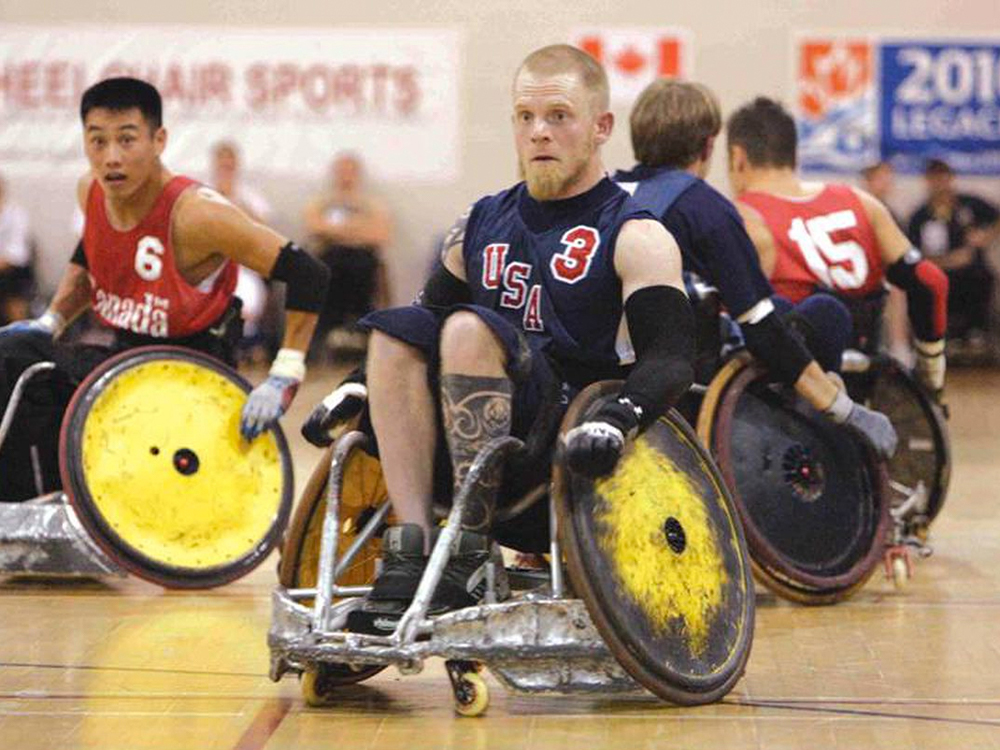
INSPIRED BY ‘MURDERBALL’
Joe Jackson and fellow Paralympian Lee Fredette were inspired to take up wheelchair rugby after seeing the 2005 documentary “Murderball,” which introduced the world to the full-contact sport.
With its focus on the rivalry between the U.S. and ?Canadian teams leading up to the 2004 Paralympics in Athens, the gripping 88-minute film looks at the intense sport and everyday challenges faced by quadriplegics. Produced on a $350,000 budget, the R-rated movie took in at least $1.5 million at the box office, earned an Academy Award nomination for Best Documentary and won the Audience Award at Sundance for Best Documentary Feature. It is No. 1 on Rotten Tomatoes’ list of top sports movies.
In his review of the documentary, film critic Roger Ebert wrote, “This is one of those rare docs, like ‘Hoop Dreams,’ where life provides a better ending than the filmmakers could have hoped for … It’s not really a sports film; it’s a film that uses sport as a way to see into lives, hopes and fears.”
The film can be watched for free at Crackle.com and on Peacock (account required).
U.S. TEAM HOPES TO STRIKE GOLD AGAIN
The U.S. Wheelchair Rugby team seeks a return to glory in Tokyo. Winner of the most gold medals since the sport debuted as a demonstration sport in the Atlanta 1996, the Americans have not been atop the medal stand for 13 years. They captured gold in Atlanta and Sidney 2000, the first year as an official sport, and most recently at Beijing 2008. The team settled for silver at Rio 2016 and bronze at Athens 2004 and London 2012.
Played on a basketball court, mixed quad rugby is a high-scoring game with elements of rugby, handball and ice hockey. All players are classified on a scale from 0.5 to 3.5 representing lower to higher levels of functional ability.
Four players from each team are allowed on the court at a time, but the sum of their classification points can’t exceed 8. If at least one teammate on the court is a woman, their team is allowed 8.5 points.
Joe Jackson has a classification of 1.0.
HOW TO WATCH
Maricopans will have a number of opportunities to watch their hometown Paralympian in action. Watching live matches might require staying up late, however, because of the 16-hour time difference.
A record 1,200 hours of NBC Universal coverage of the Tokyo Games will include live wheelchair rugby action. NBCSN will televise action from all events from 6 p.m. to 6 a.m. MST daily. Early wheelchair rugby matches will be live-streamed on NBCOlympics.com and the NBC Sports app. Medal-round coverage will be broadcast on Peacock.
Here’s the U.S. Wheelchair Rugby team schedule (all times MST):
Aug. 24, 7:30 p.m. – U.S. vs New Zealand
Aug. 25, 7:30 p.m. – U.S. vs. Canada
Aug. 27, 1:30 a.m. – U.S. vs. Great Britain
Aug. 27, 7:30 p.m. and Aug. 28, 1:30 a.m. – Semifinals
Aug. 29, 2 a.m. – Gold medal match
This story appears in the August issue of InMaricopa magazine.







![Who’s the Best Mom InMaricopa? Nominate now! Marlene Marshall, Christina Olivares, and Meghan Bremer. [Bryan Mordt]](https://www.inmaricopa.com/wp-content/uploads/2023/05/BCM_8465-218x150.jpg)
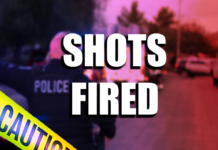
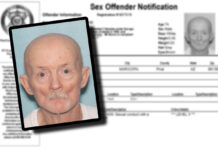
![Alleged car thief released without charges Phoenix police stop a stolen vehicle on April 20, 2024. [Facebook]](https://www.inmaricopa.com/wp-content/uploads/2024/04/IMG_5040-218x150.jpg)






